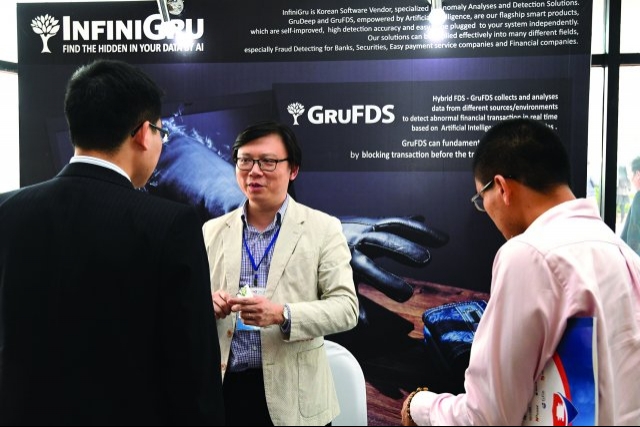[ad_1]
In the eight months since it successfully secured Series C funding from two South Korean venture investment funds, the Vietnam-based mobile content platform Appota has launched several campaigns to diversify its products and services, in particular focusing on advertising and FinTech.

This third call by Appota was also the first time a tech startup in Vietnam received funding from South Korean investment funds.
The two investment funds were Korea Investment Partners (KIP) and Mirae Asset Venture Investment. KIP led the undisclosed Series C funding round, under which Mr. Sang-Ho Park, Director of Investment at the Seoul-headquartered fund, will join Appota’s Board of Directors.
Mirae Asset Venture Investment, meanwhile, is a venture capital and buyout firm. The joint investment valued Appota at about $50 million and was KIP’s maiden financing of a Vietnamese company and Mirae’s first tech investment in Vietnam.
Eye-catching startup ecosystem
Appota, which distributes digital content, primarily games, has become one of Google’s four partners in Asia deploying the giant’s Mobile Ad Exchange platform and is also developing a payment system.
Founded in 2011, it graduated from the Topica Founder Institute and secured Series A funding from Vietnamese e-commerce company VNP Group in 2012, followed by Series B funding from Golden Gate Ventures and Japan’s GMO Global Payment Fund in 2014.
Many other investors from South Korea are keen on Vietnam’s startup market. According to experts, following in the footsteps of venture capital firms and investors from Singapore and the US, South Korean players are now making their presence felt in Vietnam’s startup space.
South Korea’s Lotte Accelerator recently committed to investing at least $1 million in Vietnamese startups through an alliance with Vietnam Silicon Valley Accelerator (VSVA). The alliance launched an early stage venture capital fund at the end of October, as the two signed a strategic cooperation to catalyze investment into Vietnamese tech companies.
“Vietnam is one of the fastest yet stably growing economies in the world, where the Lotte Group has established a strong footprint in various sectors, from real estate, retail, and distribution to commerce and IT,” said Mr. Jin Sung Rhee, CEO of Lotte Accelerator. “It is a big market and its startups have potential.
This is why we want to invest. The foray into venture capital will transform the group towards innovation. Meanwhile, we have strong commerce infrastructure to facilitate startups in enhancing products and making them the products we will use.”
Lotte Accelerator has pledged to help Vietnamese startups commercialize and expand, by leveraging its network in both Vietnam and South Korea. The accelerator, he said, will reach other countries where Lotte is present to synergize its non-financial support for young tech firms. “In Vietnam, VSVA and its local expertise will help us screen qualified startups,” he added.
South Korean accelerators are fostering Vietnam-based startups by forming alliances with local incubators. HATCH!, a Hanoi-based startup supporter, recently reached a partnership agreement with South Korea’s Rehoboth Business Incubator. Exchange programs at universities and business associations, as well as linking startups with investment opportunities, will be part of the collaboration.
Similarly, South Korea’s ninth-largest “chaebol”, the Hanwha Group, has taken its accelerator program, Dreamplus, to Ho Chi Minh City and earlier struck an alliance with the Vietnam-based accelerator the Egg Group.
The enthusiasm among South Korean investors for Vietnam’s entrepreneurial ecosystem is considered to be in line with the Vietnamese Government’s objectives. Early this year, Prime Minister Nguyen Xuan Phuc welcomed KB Kookmin Group Chairman Yoon Jong-Kyoo to mark the 25th anniversary of the establishment of diplomatic relations between the countries.
The Prime Minister called on KB Kookmin Bank to expand its financial operations in Vietnam and praised the South Korean financial group for sharing its experience in social housing development and for supporting startups in Vietnam. He also invited the financial group to join his government’s efforts in restructuring commercial banks, including equitizations.
Entrepreneurship incubators have, in fact, been a focus of the two countries for some time. In 2015, the Korea-Vietnam Incubator Park (KVIP) in the Mekong Delta’s Can Tho city, which has committed to supporting creative ideas of startups to develop into high added value products in the Delta region, was opened with total investment of $21.13 million.
Businesses and organizations established in Vietnam and other relevant individuals involved in incubator projects and applying manufacturing technology at incubators can access the incentives on offer.
Difficulties in access
Despite the clear interest from South Korean investors, the attraction of Vietnam’s startup ecosystem remains limited compared to elsewhere in the region. Ms. Thach Le Anh, Project Manager at Silicon Valley Vietnam Accelerator, pointed out that investors are reluctant to invest in Vietnam’s startups because of the risks and an unwillingness to be first in the game.
Vietnam’s startups also face issues accessing bank capital, as banks’ lending principles require the meeting of certain conditions regarding revenue, profitability, and asset security. “Vietnam lacks capital investment in the range of $10,000-$500,000, which is where most startups in Vietnam are at,” Ms. Le Anh stressed.
Despite their experience and financial resources, foreign investors face their own difficulties in Vietnam due to overly-complex administrative procedures. According to Mr. Nguyen Manh Dung, CEO of the CyberAgent Venture Capital Fund in Vietnam, while in some regional countries it only takes between a week and a month to complete disbursement procedures, in Vietnam it can take up to a year.
The completion of investment documents requires a host of information, such as the passport of the legal representative and the business registration certificate, which must be translated from foreign languages into Vietnamese and then notarized.
All investors must also sign these documents, even though they may be in a different country. Vietnam does not accept electronic signatures, so collecting the signatures of the parties involved can easily take several months. Moreover, other licenses also slow down capital disbursement. Many startups in Vietnam are often quite passive, making it difficult to convince foreign investors to invest, Mr. Dung added.
VN Economic Times
[ad_2]
Source link
